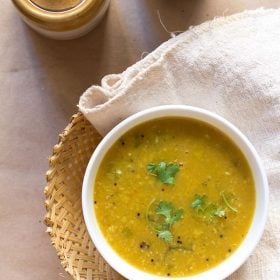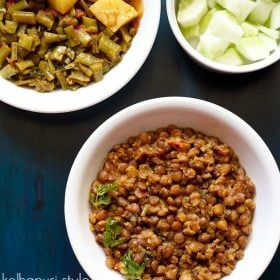
Katachi Amti is a specialty from the rich Maharashtrian cuisine. It is basically a thin, tangy and spicy lentil-based dish, made from the strained stocked of cooked Bengal gram (chana dal) which is tempered. The recipe is simple, easy and doesn’t take a long time to get cooked. Pair it with a puran poli or steamed rice, to enjoy a yummy alternative to your usual dal-rice or varan-bhaat combinations. This recipe is vegan-friendly and quite nutritious too.
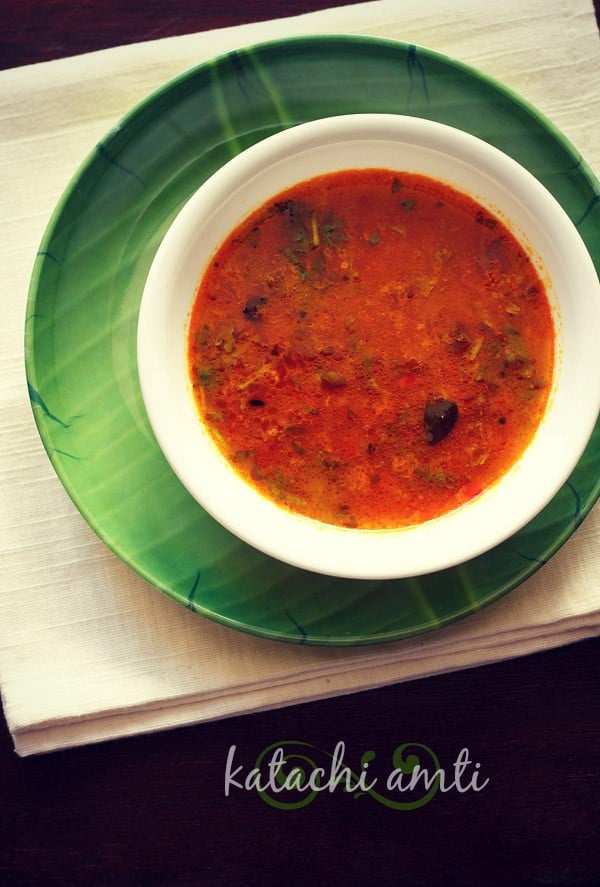

What is Katachi Amti
The name of this dish is in Marathi language, which when translated to English simply means the following:
Katachi – Kat means ‘dal stock or water’ and ‘chi’ is the Marathi suffix meaning ‘of’
Amti – Means a ‘thin, spicy, tangy and tempered soup/curry’
So, when put together, Katachi Amti becomes a traditional Maharashtrian style spicy and tangy preparation made of thin chana dal stock, which is strained and tempered. Since the pairing of this dal along with puran poli is also a hit, the water or stock after cooking the chana dal for the poli is what is essentially used to make this amti.
Although a classic way of consuming the Katachi Amti is with these stuffed flatbreads or polis, another gem of Maharashtrian cuisine, it goes irresistibly well with plain steamed basmati rice or even jeera rice. You’ve got to try all these combinations to know what works best for your palate.
Since Katachi Amti is also a no onion, no garlic dish, it is a popular choice in most of the Maharashtrian households during many religious festivals like Gudi Padwa, Ganesh Chaturthi, Holi, Dussehra, Diwali, etc. My recipe has asafoetida in it. but to make it a gluten free version, you can skip adding it.
As I said earlier, whenever I make Puran Poli at home, I also make this Katachi Amti. For the sweet stuffing of the poli or bobbatlu/holige, chana dal is cooked. The stock that is strained from the cooked chana dal (Bengal gram) can be easily used in preparing the amti.
In fact, whenever you cook chana dal to make dry stuffings for kachoris, aloo tikkis or even chana dal kababs, you can strain the stock and use it to make this Katachi Amti.
One of my Maharashtrian friends had shared this recipe of Katachi Amti with me. It’s an easy amti one as there is no grinding of any spice/masala or coconut in this recipe.
You will need Goda Masala to make this Katachi Amti without any onion or garlic. But in the absence of this special spice blend, you can skip adding it or even use garam masala powder instead. But remember, the taste with garam masala powder will be different.
Another unique thing about this Katachi Amti is that tamarind is not added in this recipe. The tangy notes are that of the tomatoes. In addition to giving the amti the desired sourness or tang, tomato is also added as there is no spice paste in this recipe. Here, I have not added jaggery. But for a slight sweet taste, you can add it.
Step-by-Step Guide
How to make Katachi Amti
Cooking chana dal
1. Rinse 1 cup chana dal (split husked Bengal gram) very well in water.
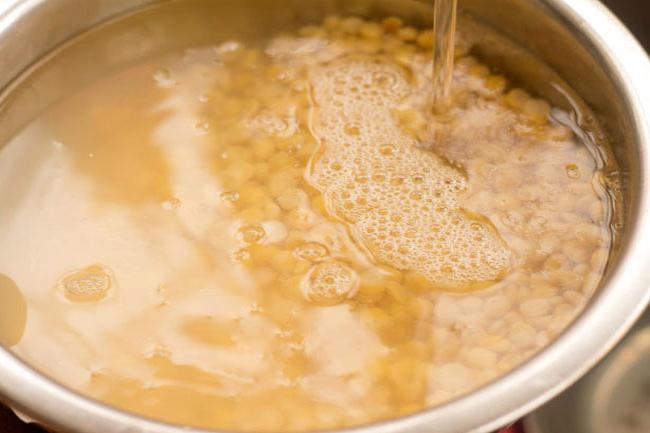

2. Then, soak the chana dal in enough water for 1 to 2 hours.
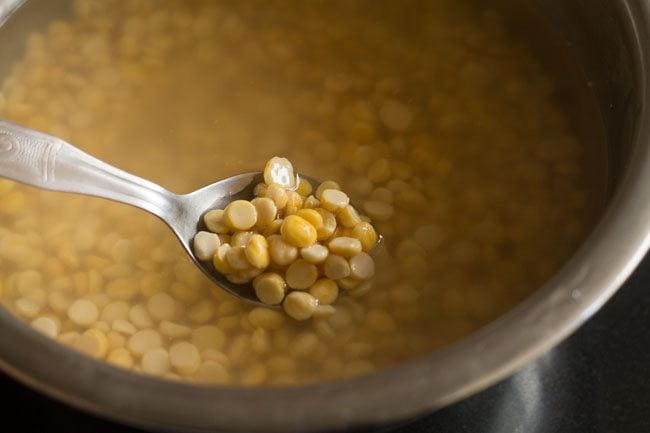

3. Later, drain the water. If you don’t have time, then you can skip soaking chana dal.
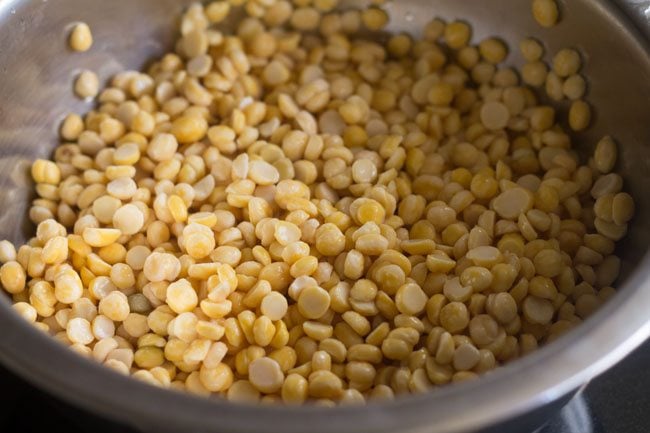

4. In a pressure cooker, add the soaked chana dal.
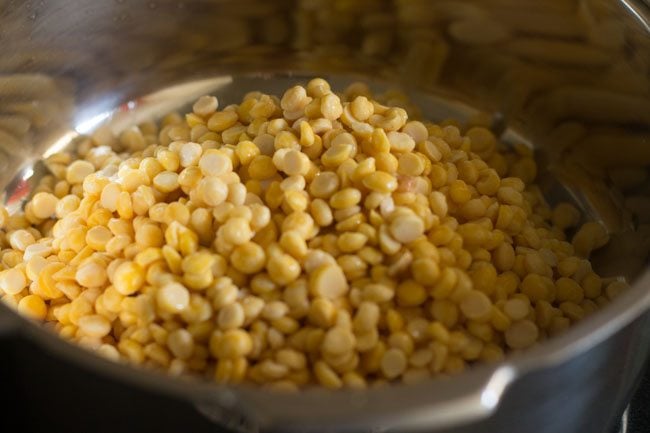

5. Pour in 3 cups water.
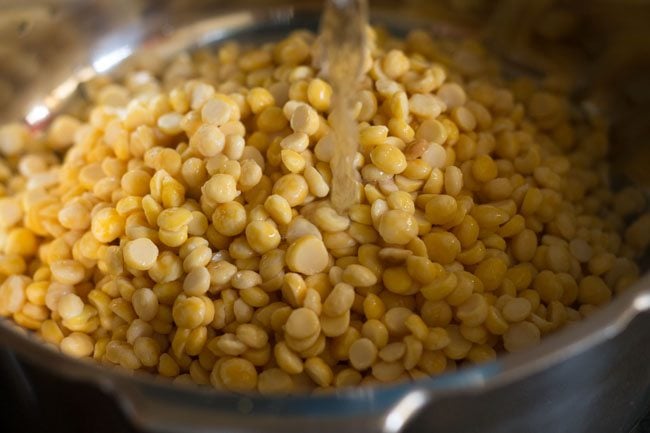

6. Cook the chana dal for 6 to 7 whistles or till softened and cooked.
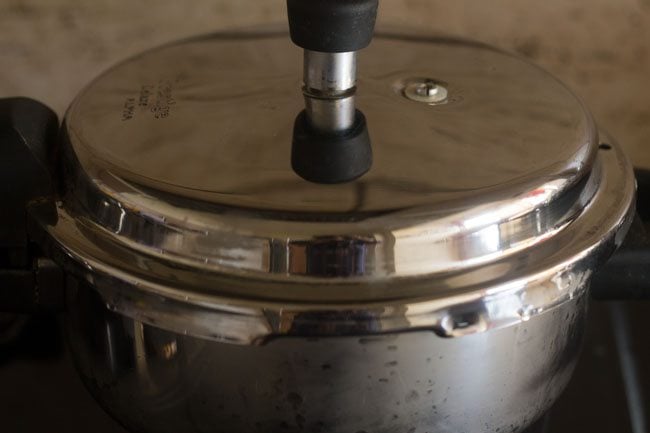

7. Once the pressure settles down naturally, open the lid of the pressure cooker.
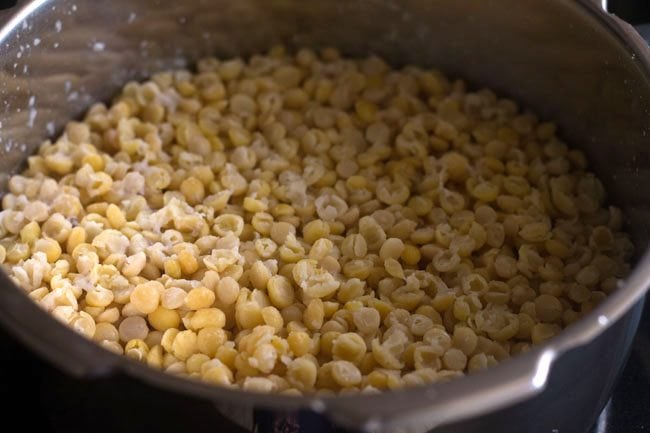

8. Strain the cooked chana dal. The dal has to be strained well. You can use a colander to strain the dal.
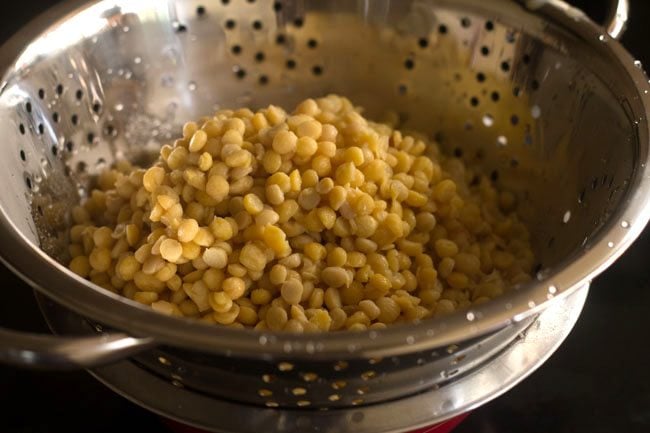

9. Use the stock to make the Katachi Amti. Also reserve 2 tablespoons of the cooked chana dal. The remaining chana dal is used to make Bobbatlu or Puran Poli stuffing. You can also make chana dal sundal or chana dal paratha from the cooked chana dal.
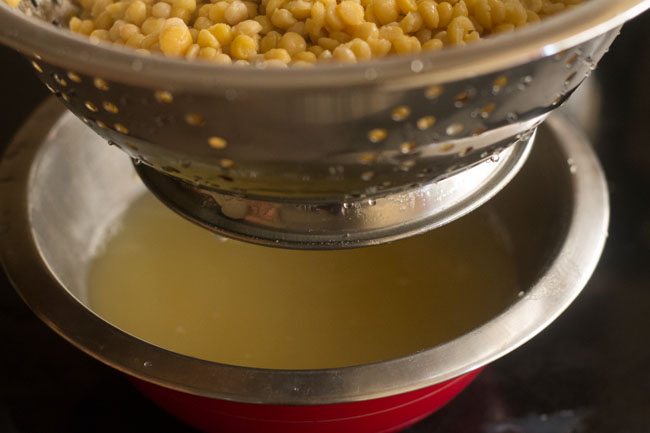

10. Measure and keep all the ingredients ready.
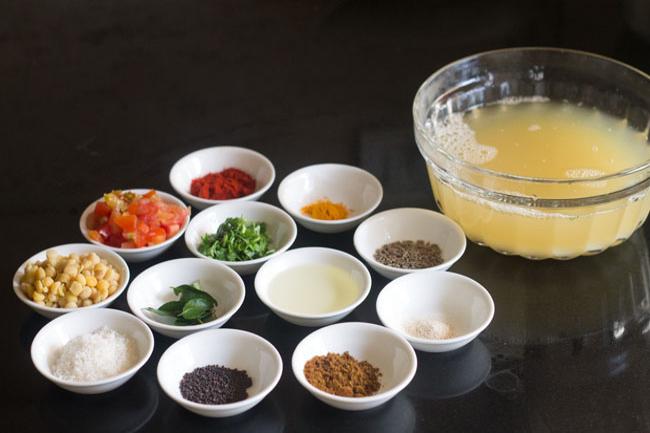

Making Katachi Amti
11. In a pan, heat 2 teaspoons oil. Keep the heat to low.
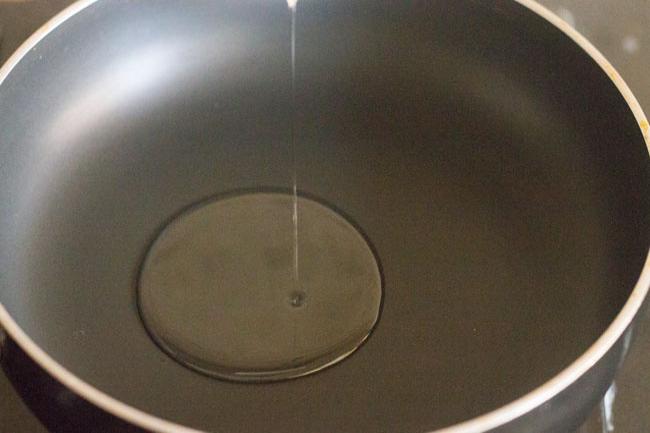

12. First, add ½ teaspoon mustard seeds.
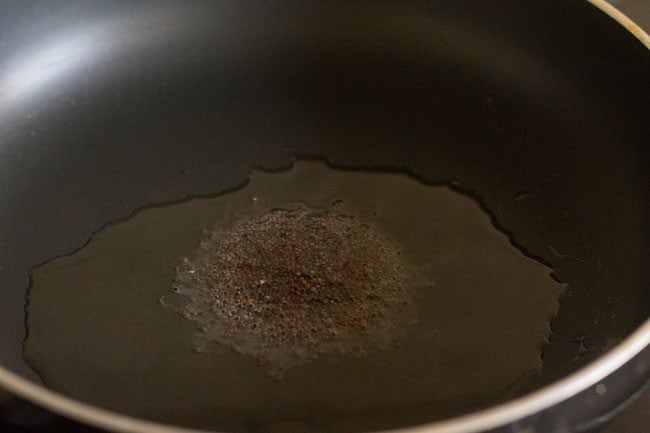

13. Allow them to crackle.
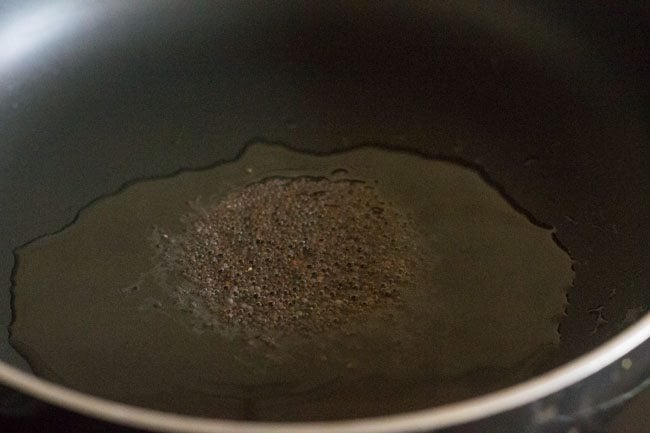

14. Then, add ½ teaspoon cumin seeds.
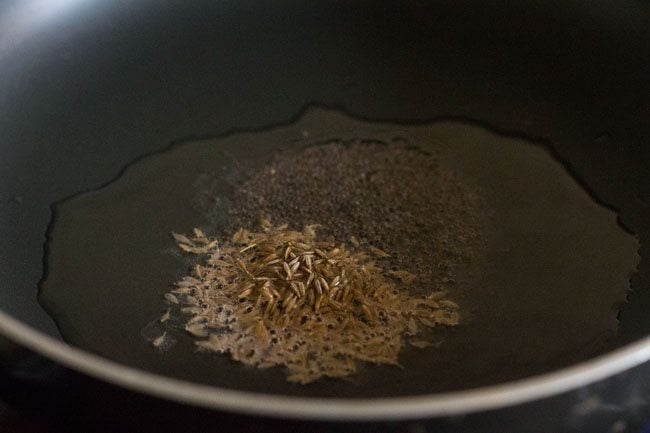

15. Sauté till they change color and turn fragrant.
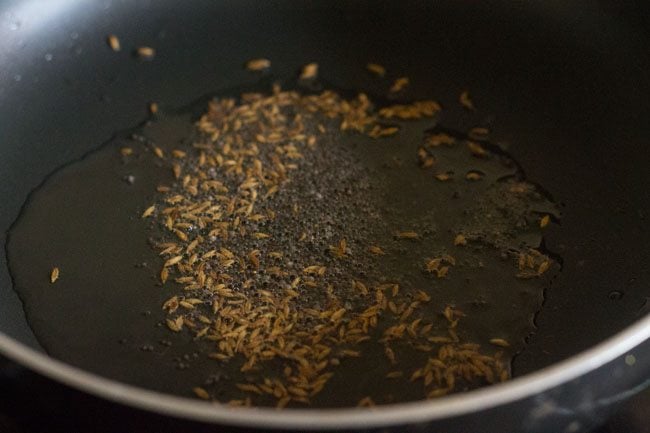

16. Then, add 5 to 6 curry leaves, ¼ teaspoon turmeric powder, 1 teaspoon Kashmiri red chili powder (or red chili powder) and 2 pinches asafoetida (hing).
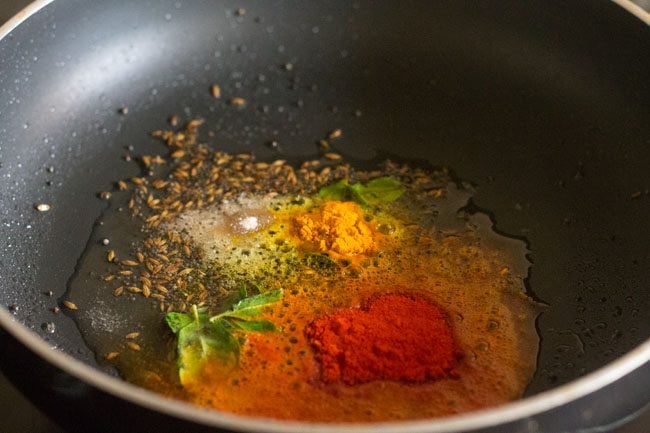

17. Stir and mix well.
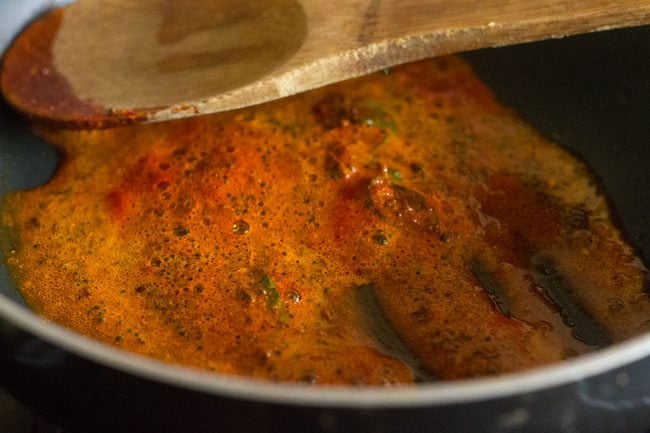

18. Next, add 1 chopped small tomato.
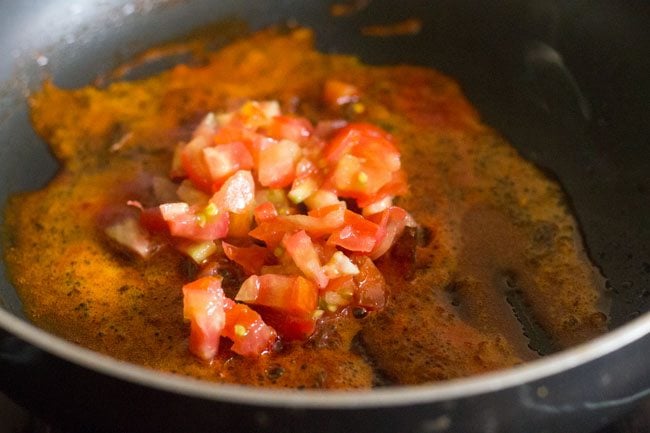

19. Stir well.
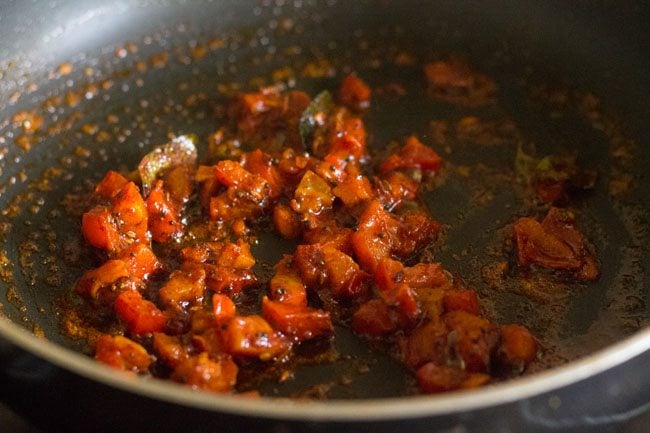

20. Sauté till the tomatoes soften.
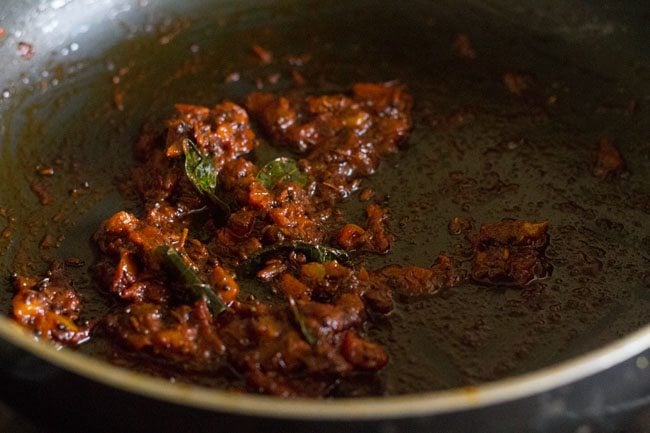

21. Then, add 2 tablespoons of the cooked chana dal which we had reserved.
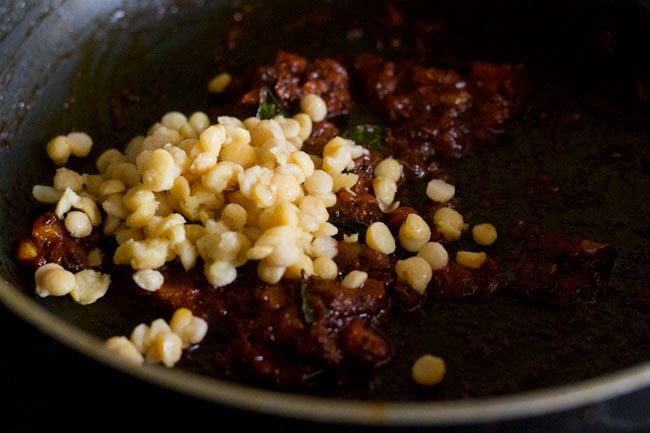

22. Pour in all the chana dal stock. You can add more water, if required.
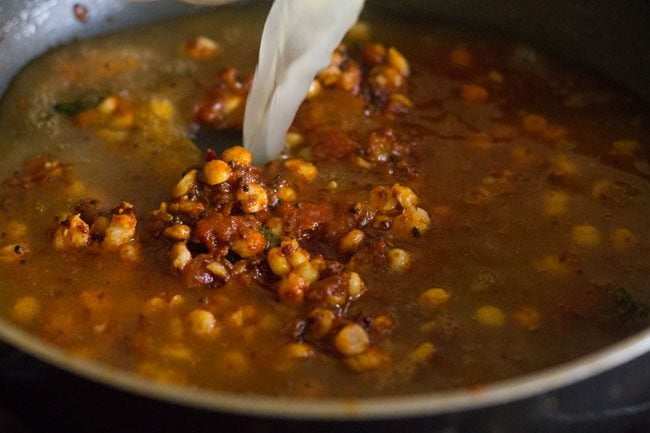

23. Mix well.
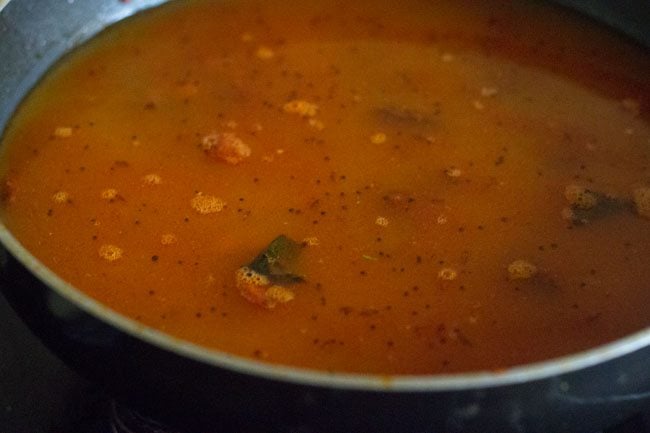

24. Add 1 teaspoon goda masala and salt as required.
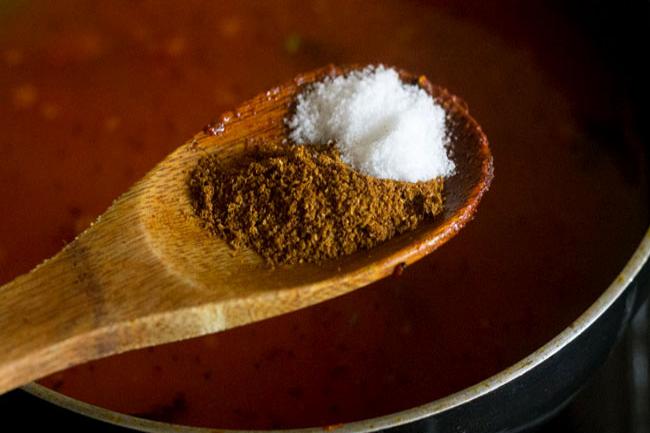

25. Add 1 tablespoon chopped coriander leaves.
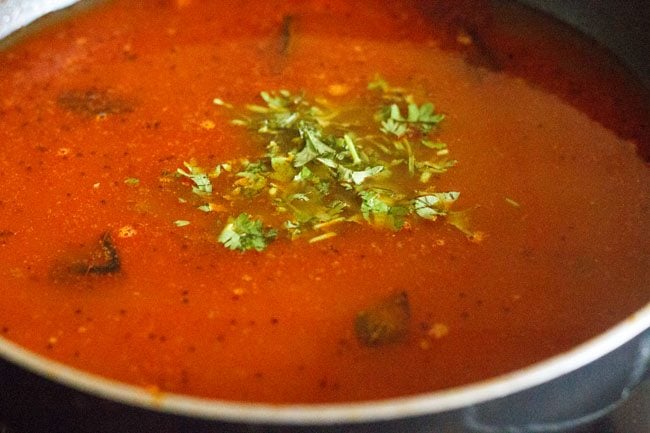

26. Stir well.
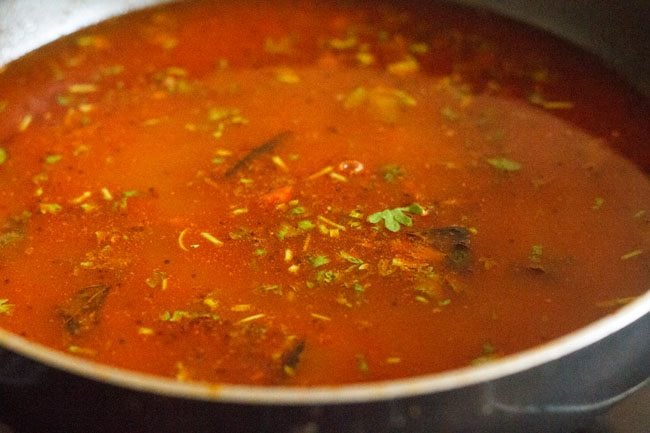

27. Let the Katachi Amti come to a boil.
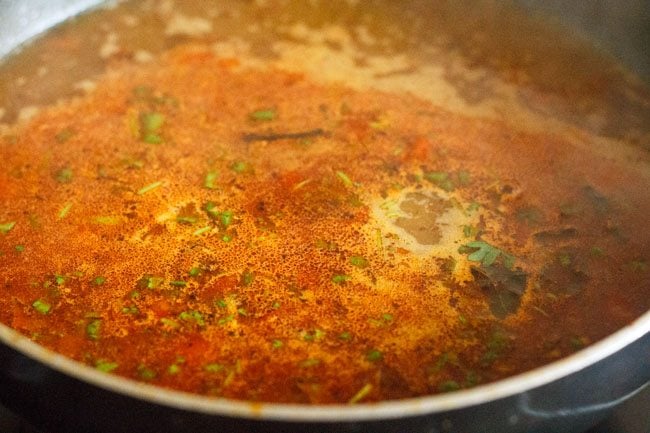

28. If adding coconut, then add about 1 to 2 teaspoons grated fresh coconut or desiccated coconut now. I used desiccated coconut.
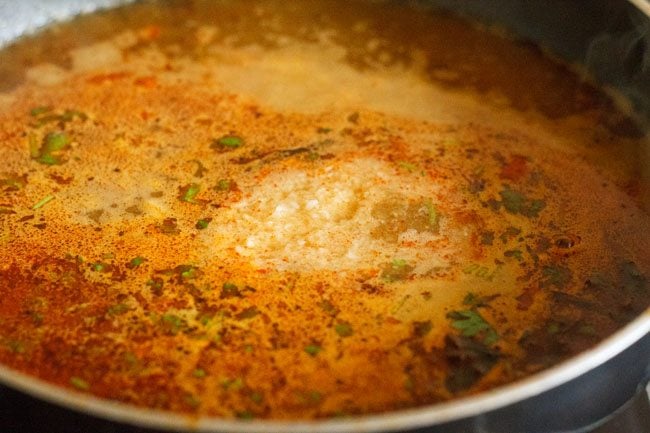

29. Mix very well.
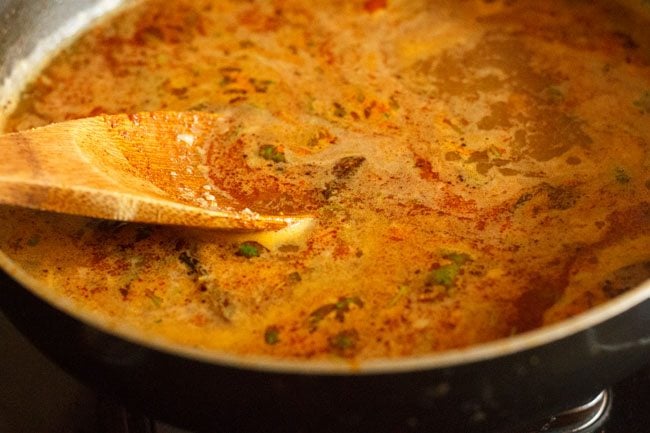

30. Lower the heat and simmer for about 5 to 7 minutes.
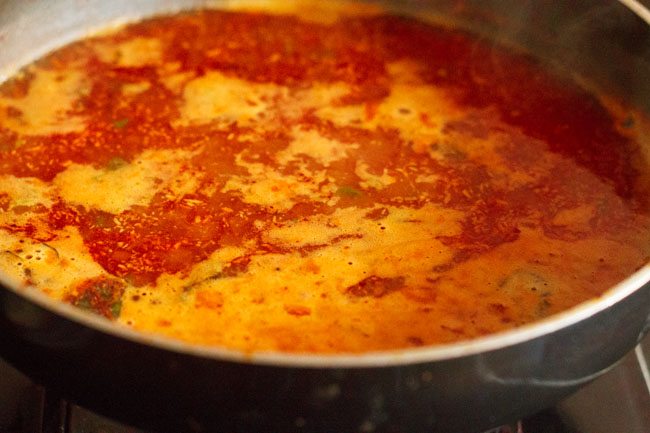

31. Garnish with some coriander leaves (optional).
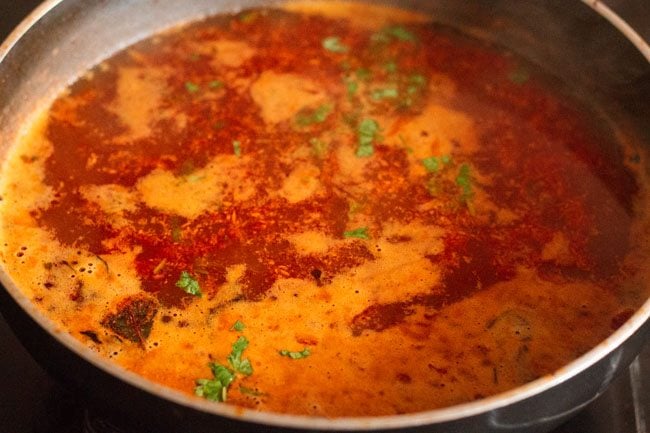

32. Serve Katachi Amti with puran poli or steamed rice.
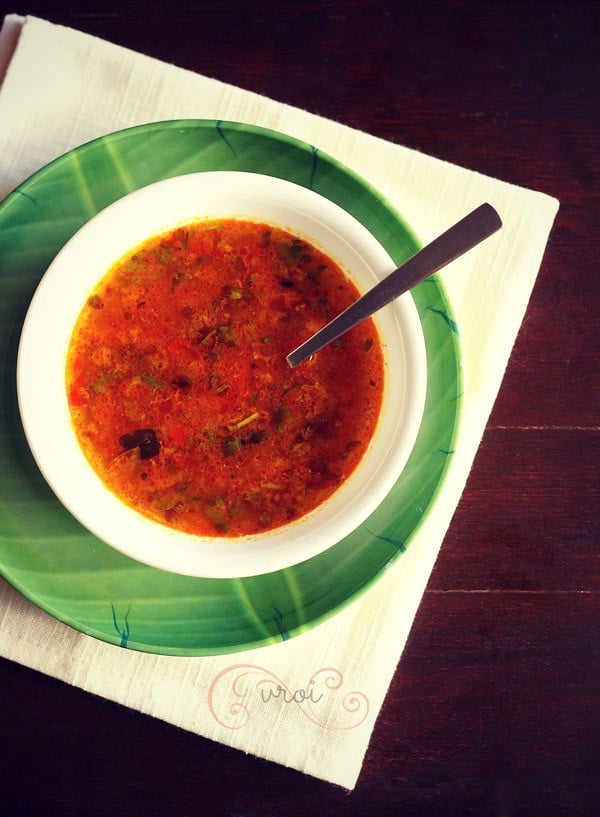

Expert Tips
- It is not mandatory to soak the chana dal. If you don’t have time, you can skip the soaking process.
- If you are cooking the chana dal specially for this amti, then you have to use its stock majorly to make this dish. However, you have to reserve about 2 tablespoons of the cooked chana dal for this amti and use the remaining to make your puran poli stuffing, paratha or Sundal from it.
- You have to add the coconut once the amti comes to a boil. You can either add fresh grated coconut or desiccated coconut.
- If you want, you can garnish the amti with some coriander leaves. However, this is optional.
More Tasty Recipes To Try!
Dal (Lentils) & Legumes
Dal (Lentils) & Legumes
Dal (Lentils) & Legumes
Dal (Lentils) & Legumes
Please be sure to rate the recipe in the recipe card or leave a comment below if you have made it. For more vegetarian inspirations, Sign Up for my emails or follow me on Instagram, Youtube, Facebook, Pinterest or Twitter.
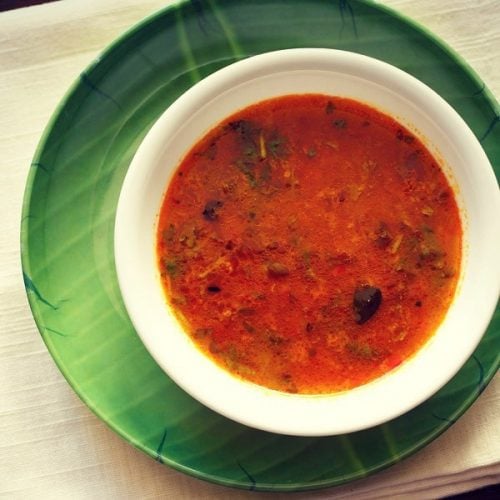

katachi amti
Katachi Amti Recipe is a thin spicy dal made from the strained stock of cooked chana dal/bengal gram. It is usually served with puran poli but also can be served with steamed rice.
Prep Time 20 minutes
Cook Time 15 minutes
Total Time 35 minutes
Prevent your screen from going dark while making the recipe
cooking chana dal
Rinse the chana dal first very well in water. Soak the chana dal for 1 to 2 hours and then drain the water.
In a pressure cooker, cook the chana dal for 6 to 7 whistles. If you soak the chana dal, the cooking time will be reduced. Once the pressure settles down on its own, strain the cooked dal. The dal has to be strained well.
Use the the stock to make the katachi amti. Also reserve about 2 tbsp of the cooked chana dal. The remaining chana dal can be used to make the puran poli stuffing.
making katachi amti
In a pan heat oil. First crackle the mustard seeds.
Then add the cumin seeds and saute till they change color and are fragrant.
Then add the curry leaves, turmeric powder, chilli powder and asafoetida.
Stir and add chopped tomatoes. Saute till the tomatoes soften.
Add the 2 tablespoon chana dal and the stock. You can add more water if required.
Season with salt, chopped coriander leaves and add the goda masala.
Stir well and let the katachi amti come to a boil. If adding coconut, then you can add now.
Lower the flame and then simmer for some minutes, about 5 to 7 minutes.
Serve katachi amti with puran poli or steamed rice.
This Katachi Amti recipe from the archives was first published in March 2014. It has been updated and republished in April 2024.

Source link
